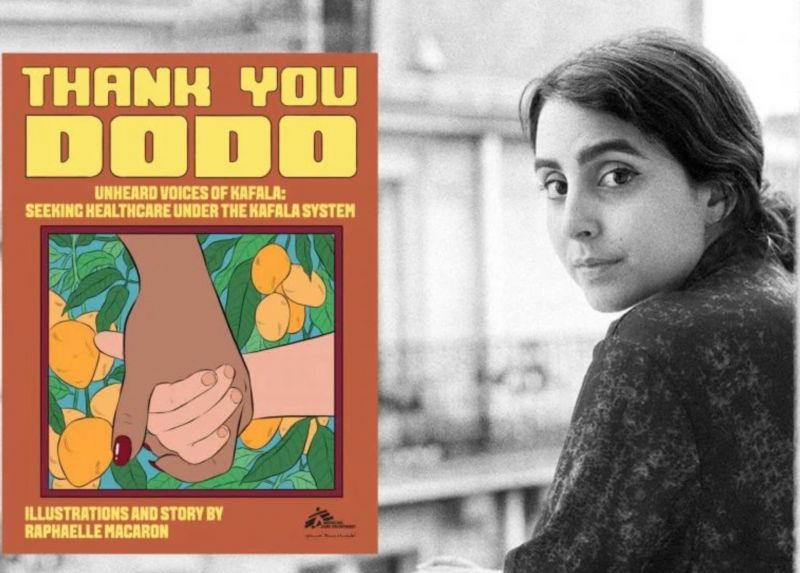
Raphaelle Macaron and her book. (Courtesy of Raphaelle Macaron and MSF)
With an economic crisis that has burdened the entire population, society’s most vulnerable have often found themselves affected the worst.
This is the case of domestic workers who arrive in Lebanon through the kafala (sponsorship) system, often without knowledge of the terms of their contracts, written in Arabic, or the type of work ahead.
In recent years, amid Lebanon’s compounding crises, many Lebanese had to dismiss their domestic workers. Many of the workers, usually women, were left to fend for themselves outside their embassies in Lebanon.
In a bid to raise awareness of the difficult situation faced by migrant workers in Lebanon, Médecins sans Frontières (MSF) sponsored the publication of a graphic novel, which is scheduled for release in mid-June. In parallel, short animated videos, inspired by the graphic novel, will be posted on MSF’s social media.
“There is often a gap between the closeness of ties forged with members of the host family and the lack of basic rights for domestic workers,” Julien Raickman, head of the MSF Lebanon mission, told L’Orient-Le Jour.
Lebanese illustrator Raphaelle Macaron was chosen to produce this work based on her personal experience with the issue.
Accompanied into her teens by Dodo, a Filipina worker, the internationally-renowned young comic book artist used her drawings to chronicle true stories of men, and women in particular, she spent three months with at the medical and social support clinic that the MSF opened in 2020 in Beirut. This was Macaron’s way of thanking Dodo, as the book title ‘Thank You, Dodo!’ shows.
Graphic novel to raise awareness
“I spent my days talking to these women, taking notes, photos and audio recordings. Then I sorted out all the material I’d collected,” Macaron recalled.
“It was a challenging time, the experiences described were so shocking... I felt I had a big responsibility of passing on precious testimonies through writing and drawing,” she said.
This is not the first time that MSF has utilized graphic novels to draw public attention to the sensitive issues.
The Ink With Hope exhibition, held in late 2022 in Beirut, showcased the work of illustrators from all over the world, particularly from the Middle East.
“Graphic novels allow a great deal of identification, as readers put themselves in the show of the characters,” added Raickman.
This is what prompted the MSF to use this format to shed light onthe living conditions of migrants in Libya and Afghanistan.
Specific support
Besides their work with Lebanese and Syrians in Arsal, Akkar and Hermel, the MSF embarked on starting a center dedicated to providing medical and social support for migrant workers in Beirut in 2020.
“During the lockdown [due to the outbreak of] COVID-19, domestic workers often found themselves in the midst of intra-family violence,” Raickman said.
“Lebanon’s economic conditions made them even more vulnerable. They can’t return to their country of origin, for lack of means or because the situation is no better there,” he said.
As the Lebanese crisis worsened, requests for care soared at the Ras Beirut center, where many migrant workers were left to fend for themselves after leaving or being abandoned by their employers. MSF plans to open another branch in Beirut’s northern suburb, Dora.
Under the kafala system, workers become illegal once they no longer have a sponsor.
This makes access to basic services even more difficult, with most living in overcrowded or unsafe accommodation and many resorting to harmful behavior to get by.
“The MSF project for migrant workers in Lebanon requires very specific support,” said Raickman. “These individuals often find it difficult to express their feelings due to cultural and language barriers.”
Thank You, Dodo
Some suffer severe mental disorders due to the extremely insecure situations into which they suddenly fall. For those who stay with their sponsor, the lack of autonomy and the restrictions imposed can have a profound impact on their mental state. Many also come to the MSF center seeking healthcare due to problems directly related to the tasks they have to perform.
“The situation of migrant [workers] in Lebanon is deeply driven by racism,” said Macaron. “These individuals have experienced discrimination, sometimes psychological and physical torture, without their tormentors facing any consequences.”
For Macaron, transcribing their experiences in a graphic novel is a way of doing them justice, paying them tribute, and expressing their revolt.
“Whether we like it or not, we are all, at different levels, facilitators of this system of oppression,” she said.
“I myself was raised by a migrant worker, Dodo, to whom I dedicate this work,” she added.
In January 2020, this woman, whom Raphaelle described as “incredibly gentle, generous, loving and strong,” died of cancer. Her passing left a wound that has not yet healed.
“It was important for me to give her a place in the narrative,” she said. “That's why the story is peppered with our memories. I miss her every day, and I owe her big time... Thank You, Dodo.”
This article was originally published in French in L'Orient-Le Jour. Translation by Joelle El Khoury.
